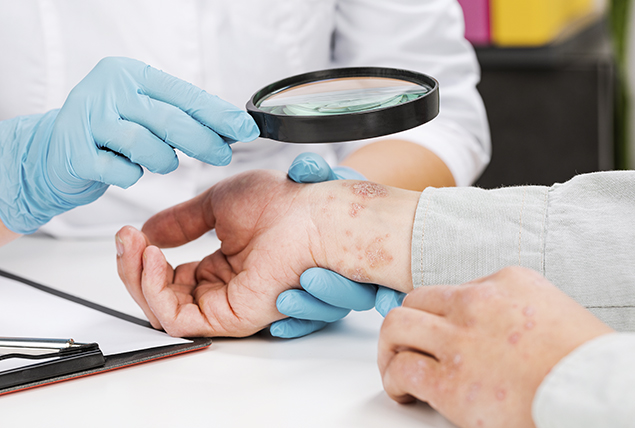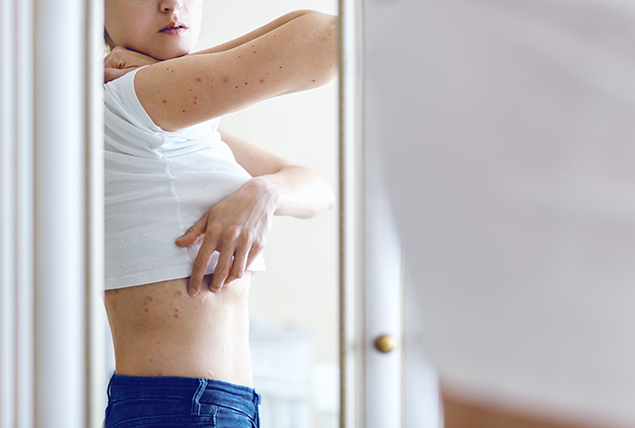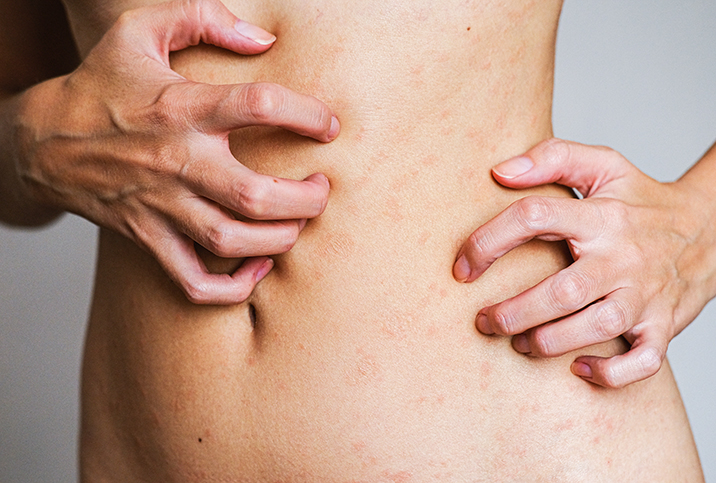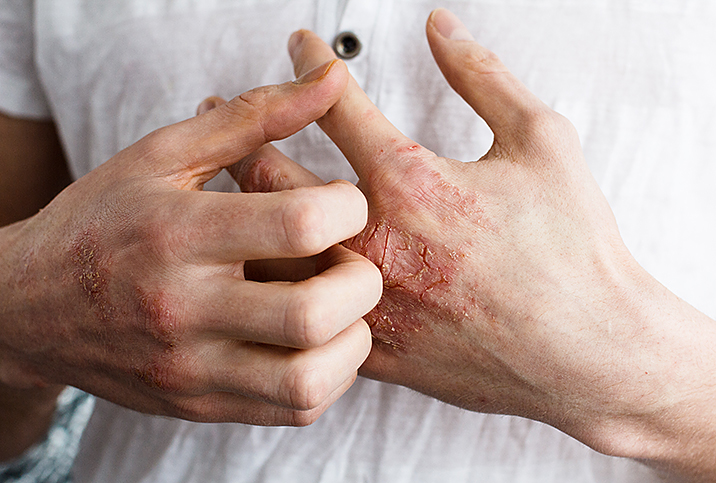Identify Symptoms and the Best Treatment for Eczema Relief

Key Points
- If left untreated, eczema can lead to bacterial skin infections.
- Eczema can affect any area of the skin but often appears on the creases and folds of the skin around joint areas.
- Simple moisturizers and over-the-counter topical steroids can help. Seek advice from your healthcare provider or a dermatologist.
Eczema is a skin condition resulting in dry, red, itchy, scaly and flaky skin, although each type can present itself differently. It can be related to a food or environmental allergy but there is also a strong genetic component.
If left undiagnosed, eczema can lead to bacterial skin infections. Don't wait to get help from a medical professional.
What are common eczema symptoms?
Eczema is not sexually transmitted and is not passed through skin contact. This chronic condition is most often seen in children, but it can be lifelong.
"Eczema symptoms vary from one person to another and can change over time. There may be inflamed, scaly and crusted areas on the front of the arms, legs and cheeks," said Brian Moore, MD and dermatology advisor at Illuminate Labs.
"It also commonly affects the back of the neck, the elbow creases and the backs of the knees. The skin may become thickened and darkened, or even scarred from repeated scratching," Moore said.
While this skin condition may occur in different areas of the body, there are a few common places eczema appears more often.
"Eczema can affect any area of the skin but often appears on the creases and folds of the skin around joint areas," said Daniel Glass, consultant dermatologist at Dermatology Clinic London.
Some of the following factors could increase your eczema symptoms, according to Moore. They include:
- Cold or dry environments
- Emotional stress or anxiety
- Exposure to certain chemicals or cleaning solutions, including soaps and detergents, perfumes and cosmetics, wool or synthetic fibers, dust, sand and cigarette smoke
- Rapid temperature changes
- Sweating
Reducing chronic stress is a great goal, but it isn't easy. Some of these eczema triggers may be tough, if not downright impossible, to eliminate. Keep tabs on what factors affect you the most, so your doctor can help you determine the right course of action.
Although it may be embarrassing at times, you can have eczema and date.
How is eczema diagnosed?
"Eczema is usually diagnosed by skin examination. Occasionally a skin biopsy can help determine the diagnosis, particularly if the patient has widespread red changes on the skin and the cause is not clear," Glass said.
"Sometimes with a contact allergy, eczema patch tests are undertaken to ascertain what is causing the reaction," he added.
Eczema can mimic other conditions. If you have long-term and recurrent itching, symptoms beginning at a young age and a personal or family history of certain allergic conditions including asthma and seasonal allergies, it could be eczema, Moore said.
"If the patient isn't sure of the diagnosis, or if their symptoms are not controlled with simple moisturizers and over-the-counter topical steroids, then they should seek help from their doctor or a dermatologist to obtain guidance on the correct diagnosis and treatment options," Glass said.
A general practitioner can help make an eczema diagnosis and recommend treatment, but in cases of more severe eczema or if the diagnosis is uncertain, they may refer the patient to a dermatologist, Moore said.
How do you treat eczema?
"Eczema is a chronic condition and it typically improves and then flares periodically. Some people have no symptoms for several years. Eczema is not curable, although it is possible to control it," Moore said.
"Many people with eczema can initially be treated by their primary care provider. However, patients may need to see a dermatologist in certain situations, such as if the condition does not improve with treatment, or if certain areas of your body are affected, like the face or groin."
Keeping your skin hydrated is a good first step.
"Emollients are lotions, creams and ointments that moisturize the skin and prevent it from drying out," Moore said.
"The best emollients for people with eczema are thick creams or ointments which contain little to no water. Emollients are most effective when applied immediately after bathing, and can be applied twice a day or more often if needed. Lotions contain more water than creams and ointments and are less effective for moisturizing the skin," he added.
Moore offered eight treatment options for treating eczema:
1. Lukewarm baths or showers
A bath or shower using lukewarm water will hydrate and cool the skin, temporarily relieving itching from eczema. An unscented, mild soap or non-soap cleanser should be used sparingly.
Hot or long baths (more than 10 to 15 minutes) and showers should be avoided since they can dry out the skin.
2. Diluted bleach baths
These baths help to decrease the number of infection-causing bacteria on the skin and prevent worsening symptoms. To prepare a bleach bath, one-quarter to one-half cup of bleach is placed in a full bathtub (about 40 gallons) of water.
Bleach baths are usually taken for 5 to 10 minutes twice per week and should be followed by the application of an emollient. It is more effective in combination with other treatments as indicated by your doctor.
3. Steroid cream or ointment
This can be used to treat mild to moderate eczema. Steroid (corticosteroid) creams and ointments are available in different strengths. The least potent steroid is available without a prescription, but stronger versions require a prescription.
4. Tacrolimus and pimecrolimus cream
These are effective in controlling eczema, although they do not work as quickly as topical steroids. They are useful in sensitive areas such as the face and groin and can be used in children over age two.
5. Oral steroids
These are occasionally used for a very short period to treat a severe flare of eczema. However, this treatment is not usually recommended for regular use or a prolonged period because of potential side effects.
6. Ultraviolet light therapy
UV light therapy—also known as phototherapy—can effectively control eczema.
However, this therapy is expensive and may increase the risk of skin cancer. UV light therapy is best for people with severe eczema whose symptoms do not respond to other treatments.
7. Injectable 'biologic' medication
Dupilumab—better known by the brand name Dupixent—may be beneficial for treating eczema.
Due to its high cost and potential side effects, this drug is reserved for adults and children aged six months and older with moderate to severe eczema who have not responded to other treatments.
8. Oral antihistamines
These treatments can help relieve the itching from eczema. The over-the-counter antihistamine diphenhydramine and prescription antihistamines, such as hydroxyzine and cyproheptadine, can cause drowsiness.
These may be especially beneficial for people who have trouble sleeping due to itching. Non-sedating antihistamines may relieve itching without drowsiness and are available without a prescription in the United States.
The bottom line
There are many options to help treat eczema. Consult with your healthcare provider or dermatologist to determine the best course of action for your kind of eczema.


















